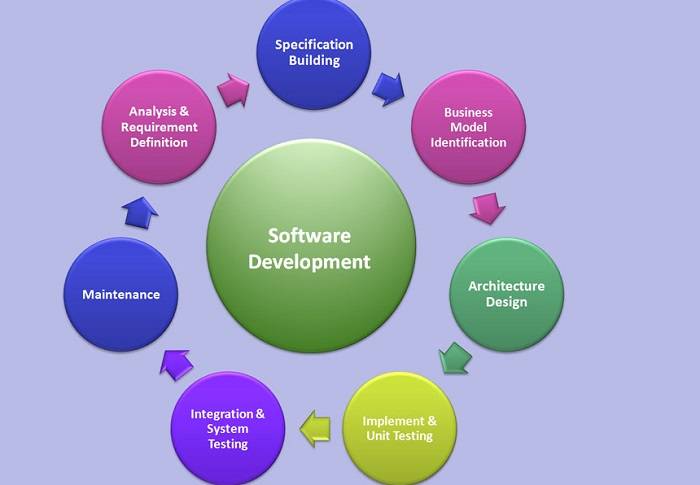In today’s digital age, software development has emerged as one of the most lucrative and in-demand career paths. With the rapid advancement of technology, the need for skilled software developers continues to grow exponentially. Whether you’re a novice looking to break into the industry or a seasoned professional seeking to enhance your skills, this comprehensive guide will provide you with the essential steps and insights on how to become a successful software developer.
Understand the Basics of Software Development:

-
- Definition of Software Development: Start by understanding what software development entails. It is the process of designing, creating, and maintaining software applications.
- Types of Software Development: Familiarize yourself with various types of software development, including web development, mobile app development, game development, and more.
- Programming Languages: Explore different programming languages such as Python, Java, JavaScript, C++, and Ruby, among others. Understand their applications and choose one to specialize in based on your interests and career goals.
Learn the Fundamentals of Computer Science:
-
- Algorithms and Data Structures: Master fundamental concepts like algorithms and data structures, which form the building blocks of software development. Learn how to optimize algorithms and efficiently manipulate data to solve complex problems.
- Computer Architecture: Gain insights into computer architecture, including processors, memory, storage, and input/output systems. Understanding the underlying hardware helps in developing efficient software applications.
- Operating Systems: Learn about operating systems like Windows, macOS, and Linux, and understand their functionalities and interactions with software applications.
Acquire Technical Skills:
-
- Programming Skills: Hone your programming skills by practicing coding regularly. Start with simple projects and gradually move on to more complex ones. Utilize online resources, coding challenges, and open-source projects to enhance your coding abilities.
- Version Control Systems: Familiarize yourself with version control systems like Git, which allows multiple developers to collaborate on projects efficiently. Learn how to use Git for managing code repositories and tracking changes.
- Integrated Development Environments (IDEs): Choose an IDE that suits your programming language and workflow preferences. Popular IDEs include Visual Studio Code, IntelliJ IDEA, and Eclipse, among others.
Gain Practical Experience:
-
- Build Projects: Apply your knowledge by building real-world projects. Start with simple projects and gradually increase their complexity. Building projects not only reinforces your learning but also provides tangible evidence of your skills to potential employers.
- Contribute to Open Source: Get involved in open-source projects on platforms like GitHub. Contributing to open-source projects allows you to collaborate with experienced developers, gain valuable insights, and showcase your expertise to the broader community.
- Internships and Freelancing: Seek internships or freelance opportunities to gain hands-on experience in software development. Internships provide valuable industry exposure, while freelancing allows you to work on diverse projects and build a portfolio.
Stay Updated with Latest Technologies:

-
- Continuous Learning: The field of software development is constantly evolving, with new technologies and frameworks emerging regularly. Stay updated with the latest trends, tools, and best practices through online courses, workshops, conferences, and tech blogs.
- Specialize in a Niche: Consider specializing in a specific niche within software development, such as artificial intelligence, machine learning, cybersecurity, or cloud computing. Specialization enhances your expertise and makes you more valuable in the job market.
Develop Soft Skills:
-
- Communication: Effective communication skills are essential for collaborating with team members, understanding client requirements, and presenting your ideas. Practice clear and concise communication through written and verbal channels.
- Problem-Solving: Software development involves solving complex problems and debugging code. Cultivate your problem-solving skills by breaking down problems into smaller manageable tasks and finding efficient solutions.
- Time Management: Learn to manage your time effectively to meet project deadlines and prioritize tasks. Use productivity tools and techniques to streamline your workflow and maximize efficiency.
Network and Build Professional Relationships:
-
- Join Communities: Participate in online forums, social media groups, and developer communities to connect with fellow developers, share knowledge, and seek advice. Networking helps you stay updated with industry trends and opens up opportunities for collaboration and mentorship.
- Attend Events: Attend tech meetups, conferences, and networking events to expand your professional network and learn from industry experts. Engage in discussions, ask questions, and exchange ideas with like-minded individuals.
- Build a Personal Brand: Establish a strong online presence by creating a professional website, blog, or portfolio showcasing your projects and achievements. A compelling personal brand enhances your credibility and visibility in the software development community.
Prepare for Job Interviews:
-
- Resume and Portfolio: Craft a well-designed resume highlighting your skills, experience, and projects. Create a portfolio showcasing your best work and providing insights into your problem-solving abilities and coding proficiency.
- Technical Interviews: Prepare for technical interviews by practicing coding problems, data structure algorithms, and system design questions. Utilize online coding platforms and mock interview services to simulate real interview scenarios and refine your skills.
- Soft Skills: Demonstrate your soft skills during interviews by effectively communicating your ideas, showcasing your passion for software development, and illustrating your ability to work in a team environment.
Becoming a successful software developer requires dedication, continuous learning, and a passion for technology. By following the steps outlined in this guide and staying committed to your goals, you can embark on a rewarding career journey in software development. Remember to embrace challenges, stay curious, and never stop learning as you navigate through the dynamic and ever-evolving landscape of software development.


